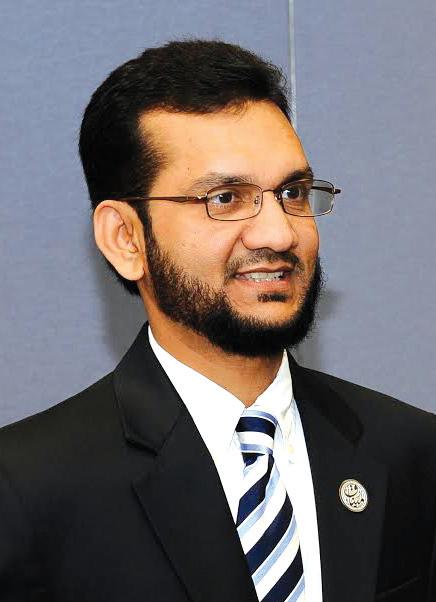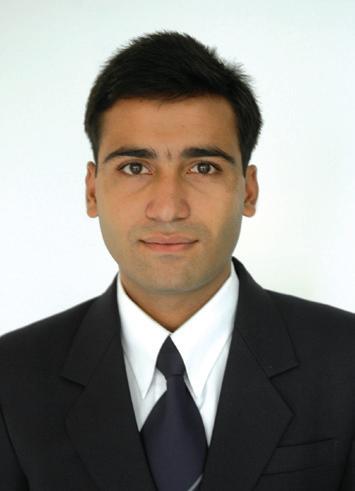Islamic Banker
Islamic Banker
Islamic Banker

Islamic Banker
Islamic Banker
Islamic Banker
Islamic Banker
Islamic Banker
Islamic Banker
Islamic Banker
In the words of Dr. Raghu Ram Rajan, a renowned economist from IMF who predicted the 2008 global financial crisis, “Competition is the life force of a modern economy – it replaces dated and inefficient methods while preserving valuable traditions; it rewards the innovative and energetic and punishes the merely connected; it destroys the stability of the status quo while giving hope to the young and the outsider. True competition eliminates the need to plan, for as gravity guides water through the shortest path, competition naturally guides the economy to the most productive route.”

Islamic Banks globally are confronted with a very unique and challenging competitive environment – They rediscover themselves over and over again (competition with the self), they demonstrate their capability when compared with their peer institutions (competition within the Islamic Banking Industry) and they also carry the responsibility to position themselves exceedingly well and extract a market share in the larger Banking industry while maintaining the thinking hat of an ambassador for Islamic Banking industry (competition between Islamic Banking and Conventional Banking industry). While the nature of competition is multidimensional, yet, it is an absolutely necessity that ethical principles defined in Shari’a law are in full compliance by the Islamic Banking institution. Therefore,
Islamic Banks are left with a herculean responsibility to excel in a highly competitive environment and still not deviate from principles, which are their very foundations. We begin this article with a premise that in a level playing field created by Central Banks across the world in their respective countries there are equal opportunities for every player in the corresponding banking industry. However, the success levels achieved are not equal and significantly different in some cases. We are attempting to examine “the what’s, the why’s and the how’s” behind this difference in success levels of various Banking Institutions and arrive at some strategic solutions that could fuel the competitive spirit driving Islamic Banks. If there is a one fundamental lesson in business that hasn’t changed and will never change, irrespective of the industry we are in, country we are in, the century we are in or for that matter, any context or environment we could think of, is the role of customer in the fate of any business. Attention and affection from customers build successful brands like “Apple” and absence of this attention and affection leads to graceful culmination of once successful businesses like “Orkut”. It is no brainer if we say, “Customers are foundation of any business”. If we have customers, we have foundation, which help us stand, survive and succeed and vice versa. Customers are changing their expectations and they expect their service providers to change for good at a much higher pace and Islamic Banks are no exception. Clients expect results to be delivered yesterday. “Click and Mortar” branches have given way to “Click and Mouse” technology. Opening a bank account is a matter of 30 seconds for some progressive banks of the world. If previous century was busy discussing a “Heaven” and a “Hell”, the modern generation is all about “Online” and “Offline”. Can the Islamic Banks afford to miss the bus in such a fast paced

progressive and competitive environment? The response and remedy is very clear to the Islamic banking industry – Customer focus cannot be underestimated and ideally it should be consolidated every minute with sixty seconds of smart and hard work. On the contrary, there is another lesson in business which has changed significantly from the past decade is the “Economics of Costing to Pricing” giving way to “Economics of Pricing to Costing”. Earlier, businesses used to calculate their cost arithmetically and arrive at a price that customer was expected to pay. However, nowadays, businesses know ahead of time the price that a customer is willing to pay and in order to stay in the competition, cost is adjusted accordingly. It is easier said than done. The engineering behind this is often referred to as operational transformation and keeping pace with the modern times, Islamic Banks are harnessing technology to stay competitive. Once again, the response and remedy is very clear to the Islamic banking industry –Change is the only constant in the equation of banking, and “sooner
the better” makes more sense than “better late than never”. Having discussed lessons in business that remained constant or had been the game changers, one cannot overlook the role of central banks across the world in promoting Islamic Banking industry. Though every central bank have made some serious efforts in the right direction, to the best of their potential and in line with the realities of their respective economies, yet, some efforts were more successful than others. To put things in perspective, without any doubt, Malaysia has served Islamic Banking industry more than any other economy. It is a leader in virtually any form of Islamic Finance activity that one could think of, be it Islamic Banking, Takaful, Islamic Capital Markets etc. Of course, credit should be given to progressive Islamic Finance Institutions (IFI’s) in Malaysia for being a leader and maintaining this leadership ever since they started leading; yet one cannot be ignorant enough to acknowledge the critical role played by Bank Negara Malaysia (BNM) for regulating, and more importantly regulating progressively and positively. An evidence of progressive thinking is found in BNM’s financial sector blueprint 2011-2020, which amongst other visionary statements, mention about enhancing the capability of insurance and takaful industry, which are inevitable to growth of Islamic Banking industry. Once again, the response and remedy is very clear to the Islamic banking industry – “Inspire the central bank in your respective jurisdictions through your asset quality and the quality of market offerings so that they could chart a progressive and growth oriented roadmap for prosperity of the industry. One shouldn’t forget that an actor is only as good as his or her director. Hence, central banks have a bigger responsibility to navigate the industry and its players in the right direction and create opportunities for growth ”. “Social media” is gradually
becoming the game changer for every industry and Islamic Banking industry is no exception. If its capabilities are harnessed, an entity moves forward and if not, an entity virtually remains “as is” but in reality “moves backward” owing to relative forward movement of those leveraging it. Gone are the days when customers searched for platforms to express their opinion. In today’s world, the idea is to “Have an opinion on everything”. Therefore, customer is not only a customer but also a proactive journalist by virtue of social media who openly demands quality in products and services it consumes and have the ability to influence purchasing decisions of other customers. A sad experience of one existing customer, could lead to loss of opportunity deemed to originate from hundred potential customers or prospects. It’s a tough task for Islamic Banks to strike a right balance between “Happy Customers”, “Commerciality” and “Sharia Compliance”, however, this is inevitable. A marketing campaign launched after spending precious dollars could be in vain if a photograph of a nonfunctional ATM is uploaded by a dissatisfied customer to the web and goes viral. It could do enough damage to reputation that no marketing campaign could heal, despite spending additional dollars. The reason being, there are more prospects on web watching the “photograph leading to negative publicity” than those watching a “promotional TV commercial” of a bank. People are spending substantial part of their time daily on web; therefore, a bigger attraction of a new product or service is likely to originate from the web. As someone rightly pointed out, Marketing is no longer about the product you make, but about the stories you tell. Good stories lead to higher revenue and bad stories lead to higher expenditure in correcting the errors and eventually, lower revenue.
Once again, the response and remedy is very clear to the Islamic banking industry – “The essence of social media is knowing your audiences and engaging them in something they love”.
Islamic Banks should capitalise upon their direct and indirect strengths and neutralise their direct and indirect weaknesses. Taking strengths into consideration, one of the biggest customer base for a given Islamic bank is that section of population, which takes into consideration moral consequences of a financial transaction, which Islamic bank actually does and conventional bank is neutral to this concept. In essence, since Islamic bank advocates this concept, it is its strength. The larger question is, what happens in a jurisdiction where Islamic Banks do not exist and a major section of the population is unbanked simply because they do not find appropriate destinations to park their assets on account of reasons like moral consequences of transactions, ethical banking etc. The direct consequence of this fact is another fact i.e. Islamic Banks play a major role in making a country pursue its economic strategy of Financial Inclusion and sustainable development. If citizens decide to remain unbanked in the absence of Islamic Banking institutions, effectively, the corresponding country can never claim to be a Financially Inclusive nation. Isn’t this something that Islamic Banks should be proud of? However, are they using this strategy to grow in regions where the footprint is negligible or small? Unfortunately, none of the Islamic banks have truly identified their role in “Banking the Unbanked” on a global scale. A silo in Malaysia is satisfied in Malaysia, a silo in UAE is happy in UAE and so on and so forth. In regards to this particular matter, the response and remedy is not very clear to the Islamic banking industry. The ideal response emanates from Jim Collin’s authored title “Good to Great”, which
emphasizes on the idea “Good is the enemy of the Great”. We do not have great schools because we have good schools. Similarly, we do not have great banks because we have good banks.
The strategy of contentment with “good” has to give way to the dynamic strategy of being ambitious and aiming “great”. Islamic Banks shall come out of their comfort zone and envision the opportunity of going global. They have a big responsibility of making countries and the world at large Financially Inclusive. In the context of re-engineering, we couldn’t do a better job at defining the term as good as accomplished by Hammer and Champy in the year 1993 in their bestseller “Reengineering the Corporation”. The legendry author duo define re-engineering as “the fundamental rethinking and radical redesign of business processes to achieve dramatic improvements in critical, contemporary measures of performance, such as cost, quality, service and speed”. Well known firms like GE under the exemplary leadership of its CEO’s like Jack Welch have made a mark to the world by endorsing and pursuing re-engineering strategies in their organization. Many other firms have silently or quite openly accomplished re-engineering. However, in case of Islamic Banks, apparently, re-engineering is either not pursued or marketed or thought of, or could be a combination of these scenarios. Re-engineering is a concept and Information Technology is its enabling partner. If an Islamic Bank pursues re-engineering strategies, it could offer a true competition to itself, its peer Islamic Banks and conventional banks competing for the same set of customers. For example, isn’t it a right time for Islamic Banks across the world do go ahead with paperless banking? Isn’t it a perfect time to endorse and patronize tablet banking? Isn’t it an ideal time to promote the concept of bancatakaful on the same lines as bancassurance? In
this case, the response is not clear though remedy is crystal clear to Islamic Banks. However, the response may arrive in form of execution of strategies rather than the announcement.
Islamic Banks across the world shall focus more on banking innovation and using IT to enable it. IT is very powerful. It has and can do wonders for any industry. To cite an example, emerging markets like Brazil have followed a strategy called “build-it-they-will-come” driven by a law it passed in October 2013 called “Lei Do Bem” i.e. Law of the Goods. This strategy translates into an activity that mandates smart phones in Brazil to give visibility to Brazilian made apps by either pre-loading phones with these homegrown apps or providing a dedicated marketplace on smart phones to display them. Similar initiatives towards mobile banking by other countries, can support and incentivize the relevant stakeholders (Islamic Banks) to either “pre burn” common mobile banking application on mobile handsets / SIM (Subscriber Identity Module)cards or send “over the air” using dynamic STK (SIM Application Tool Kit) to facilitate financial transactions. It would make mobile banking through Islamic Banks more scalable and ultimately reduce the cost of operations. Going a step further, all Islamic Banks in a particular country should collectively discuss and explore opportunities for standardisation in user registration, user authentication and user interfaces at least with respect to mobile banking. This could give Islamic Banking industry an edge over conventional industry in the country. In this case, we have suggested a remedy and the onus is now on Islamic Banks to respond.
Today, the investment needs of the economy, especially long term investment in areas like infrastructure, have increased. Islamic Banks should be able to finance the enormous needs of the real economy.
As the world moves towards stronger and sustainable growth, Islamic Banking industry should be a supportive partner for central banks every inch of the way. In order to shoulder this huge responsibility, Islamic Banks shall think different,
act different and we are sure customer’s response will be different too in the same proportion, characterised by a vigor and enthusiastic reciprocation, translating into a bigger commercial success for the industry.IBA
ABOUT THE WRITERS

Furqan Ahmad brings 21 years of Islamic Finance and Technology implementation experience with comprehensive understanding of diverse international market dynamics, Sharia compliance challenges, and consumer needs. He has been involved in establishment of 3 new Islamic financial institutions in USA and GCC. At Guidance in USA, he was founding project team member involved in launch of Islamic Home Finance product line, which achieved historic milestone of first USD 1 billion portfolio within 4 years. At Mashreq Al Islami in Dubai, he was founding management team member and developed a string of Asset, Liability and Sukuk products. At ADCB Islamic Banking in Abu Dhabi, in his senior management role, Mr. Ahmad was responsible for the launch of liabilities and investments propositions. As AGM at 12 billion SAR capitalised Saudi Islamic bank, Alinma, in Riyadh, Furqan was responsible for leading Retail Products & Services Development Div. with 9-member strong multicultural products team. Furqan Ahmad is currently the Global Head of Islamic Banking Practice at Indra (IBP is based in Malaysia with HQ in Spain), a global conglomerate in 128 countries, offering Financial Advisory, Training and IT Consultancy services. He is a regular speaker in international Islamic Banking conferences, published author, certified trainer and was instrumental in winning awards for his institution.

A management and engineering graduate in terms of qualification, Mr. Garg is an Investment Management professional from the Indian sub continent with nearly 8 years of experience in the Industry. He has graduated from Symbiosis, Pune, India (2007) and has completed several Islamic Finance courses from the likes of Institute of Islamic Banking and Insurance (IIBI), UK; Islamic Finance Institute of Southern Africa (IFISA) and AlHuda Center of Islamic Banking and Economics (CIBE), Pakistan. His areas of interest include role of regulators & significance of policy framework in an economy, role of Investment Promotion activities in attracting Foreign Direct Investment (FDI), aligning IT to Business (Management), Islamic Finance product development and distribution (Banking), Bancassurance, Economic strategies leading to sustainable development& Anti-trust or competition law (legal)